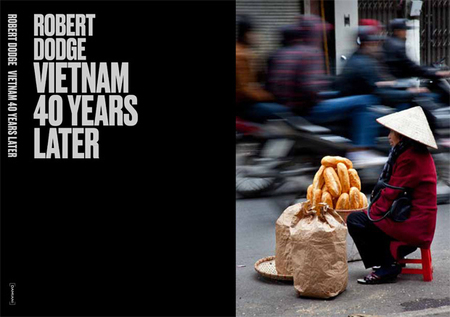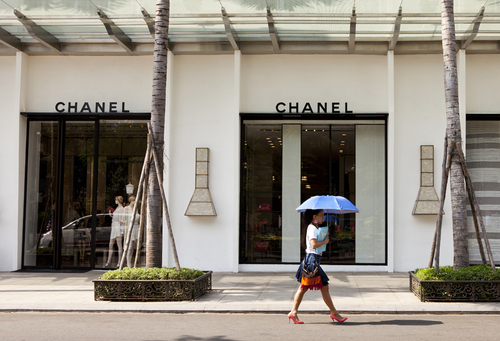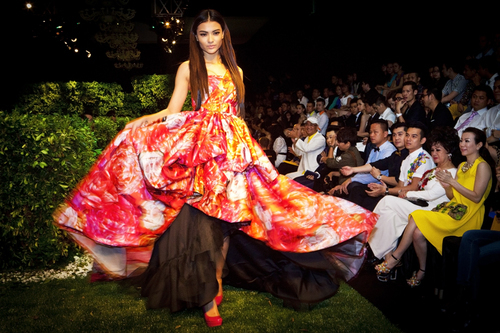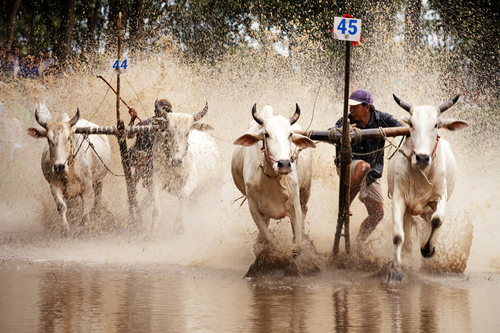Andrew Lam's Blog - Posts Tagged "hanoi"
Will Vietnam Legalize Gay Marriage--Or Only Divert Attention From Bigger Issues?
In fact, a gay-pride parade--the first of its kind--is being planned in Hanoi for August 5.
Nguyen Qui Duc is a Vietnamese American author, artist, translator and radio broadcaster, who has worked with NPR and the BBC and written for many newspapers in the United States. He returned to his Hanoi in 2006, and opened a popular bar and restaurant called Tadioto. New America Media (NAM) editor, Andrew Lam conducted an interview by e-mail with Nguyen for his point of view on Vietnam’s latest cultural trend.
Question: The news that Vietnam might legalize gay marriage came from left field for many of us in the West and many who think of Vietnam as a conservative, police state. How did this come about? Do you think it might actually happen? Or is it blown out of proportion?
Nguyen: The news came out of left field here, too, but it seems it’s Western foreign media that’s focusing on this. I am not sure how this came about, but there had been incidents within the last weeks were there were a couple of ceremonial weddings, including among university students.
I don’t think it will happen. Local people feel it may be a diversion from economic issues. People don’t seem to be talking about it too much, except within the rarified urban elite using social networks like Facebook and private blogs. This news came as people are very concerned about economic downturn, price hikes and government reactions against people protesting China’s advances in the East [South China] Sea.
Question: How are gays and gay couples being treated in Vietnam in your opinion? How are they portrayed in the media--are they still being frowned on in general?
Nguyen: People are generally tolerant, but in several occasions I’ve seen rather unsophisticated attitudes toward homosexuals. As I mentioned, in the media they’re odd balls, farcical, criminals and prostitutes. A few stories I have seen have shown them in better light but it’s a long way toward full acceptance.
I feel that many still keep themselves pretty hidden. In big cities, such as Hanoi, Saigon and Danang, there are gay clubs and cafes, but beyond that, there’s really little presence. Comments on social sites, blogs, etc., show discrimination, sometimes harsh.
Children use the word PD [short for pederast] in derogatory fashion. In many areas, the Vietnamese are still very conformist due to Confucian and Communist pressure, but at the same time--in a society in transition, fast changing, overcrowded and in the rush towards development--there’s also a “live and let live” attitude.
Question: You've been in Vietnam for over six years now and opened a bar called Tadioto in Hanoi. With your eyes on the social scene, can you comment on shifting social mores toward homosexuality?
Nguyen: I see more and more openness, especially in urban areas. There are more openly gay men and women, there are cafes and clubs for them, and it seems to not bother people in general. The mainstream media sometimes report on their activities. There are no celebrity cases, however, and in private, attitudes are still rather discriminatory.
I have also found that there’s a community of lesbian women. Some tell me they don’t like the sexist and disrespectful attitudes of Vietnamese men, so they turn to women for love. A couple of years ago, there was a trend in which women experimented with same-sex sexual relations. It was described as a fashion. Sexual activities in general seem to be unlimited for many. People say they want more independence, break-ups and divorces are frequent, and men and women have affairs fairly easily; it’s just accepted. This has a bearing on homosexual life as well.
In my bar, homosexual clients come and go openly, express themselves through attitudes, clothes, stories and normal affectionate behavior without anyone raising an eyebrow. I’ve seen this at other clubs and bars, but these are rare places where anyone is welcome. I don’t know that other establishments are the same.
But there are many gay blogs and website. The media have reported on parks and public spaces where older, more established men, presumably married, go to have gay sex.
Question: The cultural scene is changing fast in Vietnam with hip-hop dance crews, rap artists and independent films being made, such as "Hot Boy Noi Loan"--a first sympathetic film about the gay life in Vietnam, with main characters who are gay. What do young people think of the movie?
Nguyen: I have not heard a lot about “Hot Boy Noi Loan.” I have helped on several movie scripts in which gay men and women are portrayed as alienated, poor, on the fringe of society, and are criminals and prostitutes.
Question: China hasn't moved on this issue, but Vietnam is making waves. Why do you think Vietnam is advancing in this area of human rights when it's behind in so many other areas?
Nguyen: The opinion here is that this is a diversion, a measure to block criticism on repression of bloggers, or on urban protesters of government, party policies and corruption. It is also a sensitive time in regards to conflict with China. Cynical views of the government and of the ruling party are rampant, so this issue naturally falls into a category of “one more thing to doubt the government.”
In reality, I think it’s just normal in a fast developing society. People travel to many countries in Southeast Asia, such as Indonesia, Thailand, Korea and Japan where attitudes are different. As for the government, sometimes it’s trial balloons being floated around, or some high-ranking person in the government or party, who happen to have said something. Then it just balloons out to something bigger, more official. I don’t know that anything will happen.
Question: In the form of freedom of speech, it seems on the cultural ground there 's been some major shift. There are YouTube videos being produced showing gay weddings in Vietnam.
Nguyen: Urban Vietnamese now have access to social media, to new technology, to things like YouTube. And they use them. Even in a place like Hanoi, there are few things for young people to do but hang out in cafes and karaoke. So people turn to the Internet. But one must be aware that such videos or expression of alternative lifestyle only happen with a small segment of the population. They are novelties, and they are noticed. But in general, most people I know don’t even think about such issues.
Question: Vietnam is now having the first gay pride parade ever in Hanoi. August 5th. Somehow this is permissible when religious events are still tightly controlled. What to make of this?
Nguyen: It is surprising. I think it’s one of those cases where things are allowed to relieve pressure, to let people let off steam. But if it grows too big, takes on a political tone or becomes a “dangerous” precedent, or example, cracking down is not too hard [for authorities], and stopping further expressions will happen easily enough. I don’t think too many people are aware of this parade. It remains to be seen whether it will actually happen, draw a real crowd of people wishing to express themselves, or more curious on-lookers.
Having said all the above, I feel that the attention to this issue, both by foreign and local media, will bring out the issue, get things in the open, and slowly
Andrew Lam is author of East Eats West: Writing in Two Hemispheres and Perfume Dreams: Reflections on the Vietnamese Diaspora. His next book, Birds of Paradise Lost, is due out in 2013.
Vietnam 40 Years Later, A Foreword
As the 40th anniversary of the end of the Vietnam War approaches, photographerRobert Dodge offers us a compelling new view of Vietnam, my homeland, in his new book of photography: Vietnam 40 Years Later. Below is the foreword that I wrote for that book. You can order it ahead of its release here:http://www.vietnam40yearslater.com.
Four decades have passed since the last U.S. helicopter carrying refugees flew away from a Saigon in smoke, but still the ember smolders. Vietnam is no longer a war, of course, but it remains for many Americans a scar and a haunting metaphor for political disasters and tragic consequences. It evokes memories of napalm, carpet-bombings, burnt-out houses, dead civilians in black pajamas and army helicopters hovering over wounded GIs in rice paddies. And gripped by that ignominious past, Americans often regard my homeland through the eyes of the culpable.
The country called Vietnam, on the other hand, has freed itself from that historic moment. Its population has passed 90 million, more than doubling since the war ended. Fading from living memory and into history, the war is a subject barely talked about. Vietnam, in any case, waged another war in Cambodia in 1979 and occupied that country for the next 10 years. It also fought against the Chinese in 1979 and won. A few years ago, when I asked a young man on the streets of Hanoi how he felt about "the war," he looked perplexed. "Which war, uncle?" he asked. "We had around six last century."
Vietnamese, in fact, don't like to talk about wars. They'd rather talk about business and job opportunities, and the goings-on of their families. Full of young, energetic people, the country is rushing at breakneck speed toward modernity, and its gaze is relentlessly forward.
In a sense, Robert Dodge's Vietnam 40 Years Later is a counterbalance to the long-held American view of my country. Dodge, who visited Vietnam nine times in the last decade, has witnessed an enormous change there: rice paddies replaced by condos and golf courses, sleepy fishing villages turned into luxury resorts, old markets transformed into slick, marbled shopping malls.
Indeed, this volume's cover photo itself captures something of the current motif of Vietnam: movement and change. A lone baguette vendor in a strikingly red jacket sits immobile against a blurry river of people on motorcycles. But her immobility is deceptive. Despite her traditional conical hat, despite her stillness, the bread-seller wears modern clothing, down to her Western-style purse. She too, in a sense, wants to move forward. And given that there are 145 million cellular phones for Vietnam's 90 million people -- or about two for every adult -- it wouldn't be at all surprising if she, in the next frame, were to take one out from that purse.
Modernity, that is to say, seeps in. You can see it as a river of motorcyclists rushing by while above them looms a Starbucks sign. Or take a look at the farmer standing in his bare feet on the verdant slope: Two oxen graze nearby, but he is preoccupied with chatting on his cell. Or consider the new cityscape of Saigon, my birthplace, now renamed Ho Chi Minh City, with its high-rises being constructed -- and see the once-sleepy town of villas and lycees and tree-lined boulevards transforming itself into a bona fide 21st-century metropolis.
What can we discern from Vietnam 40 Years Later? That first and foremost, Vietnam is an active verb. In it, people work and they work hard. In the following pages, you will see Vietnam as a country powered by backbreaking labor -- factory workers, fishermen, farmers, market vendors and cyclo drivers -- something that has never changed. And women, more often than not, work even harder than men: See them carry baskets of salt, see them row boats to the market, see them sell fish and flowers, see them harvest rice.
But to the discerning eye, there is a growing schism between the haves and have-nots. There's a Vietnam that is moving toward a conspicuous consumerist culture, a new upper class living a grand life with armies of servants waiting on them hand and foot. Then there's a Vietnam that remains mired in poverty, one in which millions live hand to mouth.
The photo of the young woman in red stilettos walking past the Chanel store in downtown Saigon, for instance, stands in contrast to the image of the tribal woman making sticky rice in her ramshackle mountain home. A purse in that Chanel store could easily purchase 10 impoverished children in the Mekong Delta, where desperate parents have been known to sell their daughters across the borders to human traffickers -- for a mere $400. Indeed, despite enormous changes and economic progress, there's a gigantic gap between those who work to survive and those who own villas and fly overseas to shop 'til they drop. In the age of raging red capitalism , Vietnam is a country of humiliating poverty and extraordinary if increasingly unwarranted wealth.
What else? Vietnam is a world in motion, in flux. You can see this simply by looking at Dodge's gorgeous photograph of the gigantic billboards that line the bank of the Bach Dang River. They have phone numbers on them; they are waiting for potential marketers -- Tiger Beers, Starbucks Coffee, Sanyo -- to place their ads. You can see it in the fashion show that the upper class enjoys, the nouveaux riches applauding the model flourishing her red skirt into a blossoming hibiscus on the catwalk. You can see it in the gigantic crane at the dock lifting a forklift truck to shore. And you can see it in the stylish entrance of the brand new Melbourne-based RMIT university campus, which recently opened in Vietnam to offer programs from business and management to design and micro-engineering.
Yet still, in Dodge's photos, I am heartened to see that my homeland remains as much a breathtaking beauty as she ever was. She's made of majestic mountains shrouded in the morning fog, of sand dunes under tropical sunlight, of limestone karsts and isles, and she's shaped by the eternal sea lapping at her shore. And she is not always about work: She's also made of smiles and laughter, of leisure and of celebrations. The temples and churches are always full of worshippers on religious holidays. Over food and drinks, fishermen gossip and chat after a hard day's catch. For Tet, the Lunar New Year, parents and children dress up and walk the streets in jubilation. And it is a statement on Vietnamese spirituality and a deep sense of aesthetics and religiosity that flowers are always in high demand at the market.
My two favorite photos: A Buddhist monk sits on the tile floor, smoking a cigarette. He peers out to a bright world through a door ajar, the smoke drifting lazily. Part of his saffron robe, lit by sunlight, seems like it is made of fire itself. And there's the gorgeous image of the oxen race of Chau Doc in the Mekong Delta. The oxen are harnessed together in pairs. Team 45 is leading, team 44 catching up from behind. The muddy water splashes upward, a rising curtain in blistering sunlight; see the enviable joy on the racer's face.
For Dodge, no doubt, it is a difficult task to pick from the thousands of images he took in my country. What to leave out? Gay lovers? Internet cafes? Sidewalk prostitutes? Street protests against an authoritarian regime? Luxury resorts and beaches? What about the new McDonald's that just opened? Or that beauty weight-lifting contest? After all, anyone who wants to describe Vietnam knows that one cannot fully chronicle a raging river. The complexity of Vietnam will always elude efforts to capture her.
Vietnam 40 Years Later is people-centered, however, to its credit, and thereby manages to depict a new historical moment: a country at a crossroads, one that is part of the global society and yet, like the farmer talking on the cell phone, one that still has its feet in the mud.
That a book of photographs narrates the human dimension of Vietnam at an important historical juncture is, therefore, very welcome. No doubt it will help loosen the grip that wartime memories have on those who still hold tightly to the "What we did to them" lens. At the very least, Vietnam 40 Years Later should help expunge images of napalm and burnt-out villages and dead soldiers. Let it be known that after the B-52 bombs fell, life goes on -- indeed, thrives. The craters have, after the monsoons, turned into ponds in which farmers raise fish, and in which ducks and children swim; the broken wings of a downed airplane have become rusty bridges across small rivers, connecting neighbors and villages.
Franz Schurmann, well-respected historian, sociologist and world traveler, once observed that you cannot fully understand a society unless you watch "lives lived every day." That is, the way to understand the dynamic of nations is not simply to eavesdrop in the corridors of power, but to chronicle and detail the energy and movements on the street. "The collective soul of the people gives direction to the nation," he said.
Applaud the photographer, then, for his unwavering curiosity as he navigates the neighborhoods and streets and cities and landscapes of Vietnam. Admire these photos, and see them as snapshots of an unfolding epic. See them, if you will, as an invitation to travel, to see Vietnam of the here and now, and as a topography of a once-wounded nation, now healed; a barely discovered country.
To contact Robert Dodge: Robert@RobertDodge.com | www.RobertDodge.com. He's also fundraising to pay for it. Help support him here
Andrew Lam is an editor with New America Media and author of the "Perfume Dreams: Reflections on the Vietnamese Diaspora," and "East Eats West: Writing in Two Hemispheres." His latest book is "Birds of Paradise Lost," a short story collection, was published in 2013 and won a Pen/Josephine Miles Literary Award in 2014.
Follow Andrew Lam on Twitter: www.twitter.com/andrewqlam








